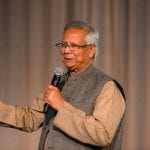Thursday, October 27th, 2022
9:00 a.m. – 10 a.m. ET
Lindner Family Commons
Elliott School of International Affairs
1957 E Street, NW, 6th Floor
and Virtually via Zoom
We are pleased to invite you to a conversation with Nobel Peace Prize laureate Muhammad Yunus, the founder of the Grameen Bank in Bangladesh who created a model for combating poverty through microlending. He is the author of three books, including Banker to the Poor and A World of Three Zeroes: The New Economics of Zero Poverty, Zero Unemployment, and Zero Carbon Emissions. The event will be moderated by Prof. James Foster, Oliver T. Carr Jr Professor of International Affairs and Professor of Economics at the George Washington University. Prof. Foster is known for developing the Global Multidimensional Poverty Index (MPI) along with Dr. Sabina Alkire. Elliott School Dean Alyssa Ayres will provide welcome remarks.
Coffee and breakfast will be provided for in-person attendees.
About the Speaker:
 Nobel Laureate Professor Muhammad Yunus is the founder of Grameen Bank, pioneering the concepts of microcredit and social business, founding more than 50 Social Business companies in Bangladesh. For his constant innovation and enterprise, the Fortune Magazine named Professor Yunus in March 2012 as “one of the greatest entrepreneurs of our time.” At the Opening Ceremony of the Olympic Games Tokyo 2020 Professor Yunus was conferred with the Olympic Laurel award for his extensive work in sports for development, bringing the concept of social business to the sports world.
Nobel Laureate Professor Muhammad Yunus is the founder of Grameen Bank, pioneering the concepts of microcredit and social business, founding more than 50 Social Business companies in Bangladesh. For his constant innovation and enterprise, the Fortune Magazine named Professor Yunus in March 2012 as “one of the greatest entrepreneurs of our time.” At the Opening Ceremony of the Olympic Games Tokyo 2020 Professor Yunus was conferred with the Olympic Laurel award for his extensive work in sports for development, bringing the concept of social business to the sports world.
In 2006, Professor Yunus and Grameen Bank were jointly awarded Nobel Peace Prize.
Dr. Yunus is the recipient of 63 honorary degrees from universities across 26 countries. He has received 143 awards from 33 countries including state honours from 10 countries. He is one of only seven individuals to have received the Nobel Peace Prize, the United State Presidential Medal of Freedom and the United States Congressional Gold Medal. He has appeared on the cover of Time magazine, Newsweek and Forbes magazine. In 2016 GWU awarded him the President’s Medal in recognition of his service.
Professor Yunus has been stressing the need for a basic decision of ‘No Going Back’ to the old ways of thinking and doing. He proposes to create new roads to go to a new destination by creating a World of 3 Zeros – zero net carbon emission, zero wealth concentration for ending poverty once for all, and zero unemployment by unleashing entrepreneurship in everyone.
His recent focuses are:
a) Professor Yunus has been campaigning for making the Covid 19 Vaccine as a Global Common Good since June, 2020, urging the World Trade Organization to place a temporary waiver on Intellectual Property right on vaccine to free up the global capacity to produce vaccines at all locations around the world.
b) Professor Yunus has launched a programme of creating a network of 3ZERO Clubs, each club to be formed by five young people. The programme aims to engage the global youth in initiating actions for creating solutions for global problems.
Welcome Remarks:
 Alyssa Ayres was appointed Dean of the Elliott School of International Affairs at George Washington University effective February 1, 2021. Ayres is a foreign policy practitioner and award-winning author with senior experience in the government, nonprofit, and private sectors. From 2013 to 2021, she was senior fellow for India, Pakistan, and South Asia at the Council on Foreign Relations (CFR), where she remains an adjunct senior fellow. From 2010 to 2013 Ayres served as deputy assistant secretary of state for South Asia. During her tenure at the State Department in the Barack Obama administration, she covered all issues across a dynamic region of 1.3 billion people at the time (Bangladesh, Bhutan, India, Maldives, Nepal, and Sri Lanka) and provided policy direction for four U.S. embassies and four consulates.
Alyssa Ayres was appointed Dean of the Elliott School of International Affairs at George Washington University effective February 1, 2021. Ayres is a foreign policy practitioner and award-winning author with senior experience in the government, nonprofit, and private sectors. From 2013 to 2021, she was senior fellow for India, Pakistan, and South Asia at the Council on Foreign Relations (CFR), where she remains an adjunct senior fellow. From 2010 to 2013 Ayres served as deputy assistant secretary of state for South Asia. During her tenure at the State Department in the Barack Obama administration, she covered all issues across a dynamic region of 1.3 billion people at the time (Bangladesh, Bhutan, India, Maldives, Nepal, and Sri Lanka) and provided policy direction for four U.S. embassies and four consulates.
Her work focuses primarily on India’s role in the world and on U.S. relations with South Asia in the larger Indo-Pacific. Her book about India’s rise on the world stage, Our Time Has Come: How India is Making Its Place in the World, was published by Oxford University Press in January 2018 and was selected by the Financial Times for its “Summer 2018: Politics” list. An updated paperback edition was released in 2019. She served as the project director for the CFR-sponsored Independent Task Force on U.S.-India relations, and, from 2014 to 2016, as the project director for an initiative on the new geopolitics of China, India, and Pakistan supported by the MacArthur Foundation.
About the Moderator:
 Professor James Foster is the Vice Dean of the Elliott School of International Affairs, Oliver T. Carr, Jr. Professor of International Affairs, and Professor of Economics at the George Washington University. He is also a Research Associate at the Oxford Poverty and Human Development Initiative at Oxford University. Professor Foster’s research focuses on welfare economics — using economic tools to evaluate and enhance the wellbeing of people. His work underlies many well-known social indices including the global Multidimensional Poverty Index (MPI) published annually by the UNDP in the Human Development Report, dozens of national MPIs used to guide domestic policy against poverty, the Women’s Empowerment in Agriculture Index (WEAI) at USAID, the Gross National Happiness Index of Bhutan, the Better Jobs Index of the InterAmerican Development Bank, and the Statistical Performance Index of the World Bank. Prof. Foster received his PhD in Economics from Cornell University and has a Doctorate Honoris Causa from Universidad Autonoma del Estado Hidalgo (Mexico).
Professor James Foster is the Vice Dean of the Elliott School of International Affairs, Oliver T. Carr, Jr. Professor of International Affairs, and Professor of Economics at the George Washington University. He is also a Research Associate at the Oxford Poverty and Human Development Initiative at Oxford University. Professor Foster’s research focuses on welfare economics — using economic tools to evaluate and enhance the wellbeing of people. His work underlies many well-known social indices including the global Multidimensional Poverty Index (MPI) published annually by the UNDP in the Human Development Report, dozens of national MPIs used to guide domestic policy against poverty, the Women’s Empowerment in Agriculture Index (WEAI) at USAID, the Gross National Happiness Index of Bhutan, the Better Jobs Index of the InterAmerican Development Bank, and the Statistical Performance Index of the World Bank. Prof. Foster received his PhD in Economics from Cornell University and has a Doctorate Honoris Causa from Universidad Autonoma del Estado Hidalgo (Mexico).


 James E. Foster is the Oliver T. Carr, Jr. Professor of International Affairs, Professor of Economics, and Co-Director of the Institute for International Economic Policy at the George Washington University. He is also a Research Associate at the Oxford Poverty and Human Development Initiative at Oxford University. Professor Foster’s research focuses on welfare economics — using economic tools to evaluate and enhance the wellbeing of people. His joint 1984 Econometrica paper (with Joel Greer and Erik Thorbecke) is one of the most cited papers on poverty. It introduced the FGT Index, which has been used in thousands of studies and was employed in targeting the Progresa CCT program in Mexico. Other research includes work on economic inequality with Amartya Sen; on the distribution of human development with Luis Felipe Lopez-Calva and Miguel Szekely; on multidimensional poverty with Sabina Alkire; and on literacy with Kaushik Basu.
James E. Foster is the Oliver T. Carr, Jr. Professor of International Affairs, Professor of Economics, and Co-Director of the Institute for International Economic Policy at the George Washington University. He is also a Research Associate at the Oxford Poverty and Human Development Initiative at Oxford University. Professor Foster’s research focuses on welfare economics — using economic tools to evaluate and enhance the wellbeing of people. His joint 1984 Econometrica paper (with Joel Greer and Erik Thorbecke) is one of the most cited papers on poverty. It introduced the FGT Index, which has been used in thousands of studies and was employed in targeting the Progresa CCT program in Mexico. Other research includes work on economic inequality with Amartya Sen; on the distribution of human development with Luis Felipe Lopez-Calva and Miguel Szekely; on multidimensional poverty with Sabina Alkire; and on literacy with Kaushik Basu.